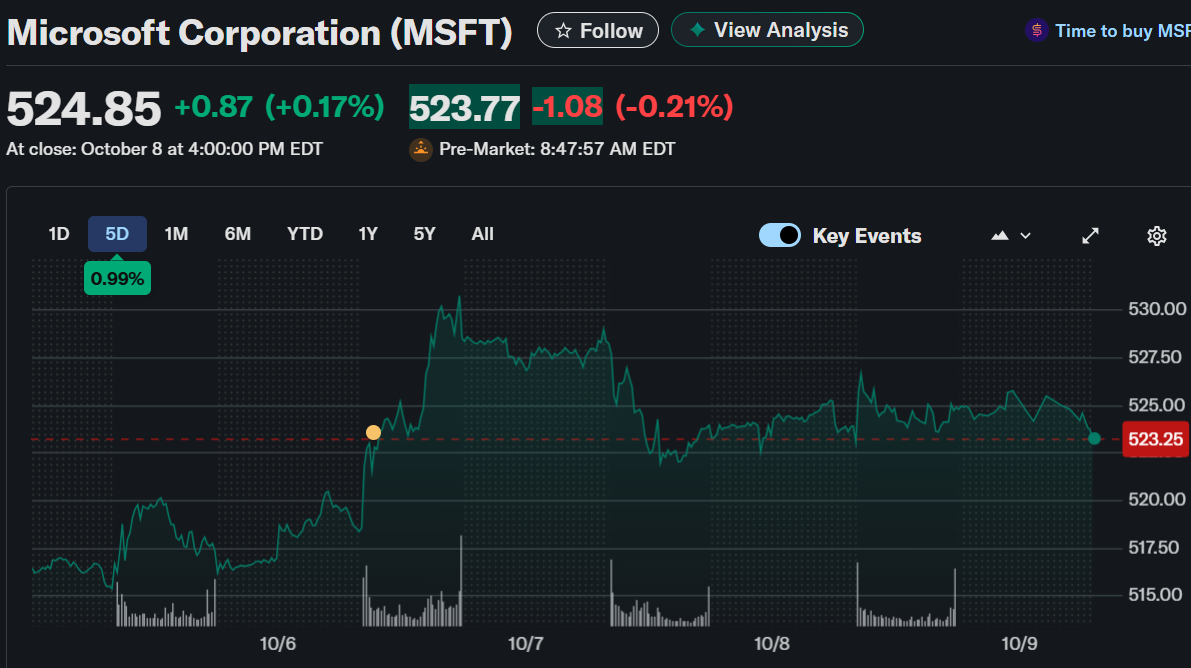TLDR
- Microsoft teams with Harvard to power Copilot with trusted health data.
- Harvard Health joins Microsoft to bring reliable medical AI insights.
- Microsoft expands Copilot with Harvard-backed medical intelligence.
- New Microsoft–Harvard pact boosts AI with verified wellness content.
- Copilot grows smarter: Harvard partnership adds health credibility.
Microsoft Corporation shares closed at $524.85 on October 8, marking a 0.17% rise, but edged down in pre-market trading at $523.00.

The movement followed an announcement of a new licensing agreement between Microsoft and Harvard Medical School. This collaboration aims to enhance Microsoft’s Copilot AI with credible health and wellness information, marking a pivotal step in the company’s expansion of artificial intelligence.
Harvard Partnership Strengthens Microsoft’s AI Health Strategy
Microsoft entered a licensing deal with Harvard Medical School’s consumer division, Harvard Health Publishing, to access verified medical content. The agreement allows Microsoft to incorporate detailed health and wellness topics into its Copilot AI assistant. Moreover, the company agreed to pay Harvard a licensing fee as part of the deal.
This strategic partnership broadens Microsoft’s ability to deliver medically accurate information through AI-assisted platforms. It also highlights Harvard’s commitment to disseminating trusted health content to a global audience. Consequently, both institutions position themselves at the forefront of digital health innovation.
The collaboration strengthens Microsoft’s AI ecosystem and diversifies its information sources beyond existing partnerships. It reflects the company’s long-term plan to enhance Copilot’s reliability with evidence-based health guidance. Therefore, the move may mark the beginning of deeper collaborations between academia and technology.
Expanding Copilot’s Capabilities with Trusted Health Content
Microsoft continues to refine Copilot’s performance by integrating diverse, authoritative content sources. Through Harvard’s medical library, the company ensures users receive well-informed responses to health-related inquiries. This approach aims to improve user trust in AI-generated medical information.
The new version of Copilot, expected to launch soon, will feature health content sourced directly from Harvard Health Publishing. It will help users gain insights into diseases, preventive care, and wellness management. As a result, Microsoft can deliver a more comprehensive AI tool that supports both professionals and general users.
This integration highlights Microsoft’s commitment to precision and reliability in health-related AI applications. It sets a new benchmark for the ethical use of AI in medical content delivery. The deal aligns with the growing demand for responsible and transparent AI solutions in the healthcare sector.
Microsoft Diversifies AI Model Portfolio for Strategic Growth
Microsoft’s AI evolution continues beyond its partnership with OpenAI, which powers its productivity tools such as Word and Outlook. The company recently incorporated Anthropic’s Claude and is developing its own AI models to reduce dependency on external providers. This diversification reinforces its competitive edge in the AI sector.
Microsoft enhances Copilot’s scope beyond productivity, venturing into healthcare technology. The company’s AI initiatives aim to build versatile platforms that deliver accurate, real-time information. Consequently, this focus may attract wider adoption across industries seeking reliable AI-driven insights.
The partnership with Harvard marks a crucial milestone in Microsoft’s AI journey. It strengthens both its technological foundation and its credibility in the health information domain. As the collaboration evolves, Microsoft’s strategic balance between innovation and reliability continues to drive long-term value growth.








